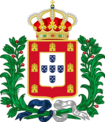| This article does not cite any sources. Please help improve this article by adding citations to reliable sources. Unsourced material may be challenged and removed. Find sources: "Infante of Portugal" – news · newspapers · books · scholar · JSTOR (July 2023) (Learn how and when to remove this message) |
Infante of Portugal (Portuguese: Infante de Portugal; f. Infanta), was the royal title of the Kingdom of Portugal, granted to the sons or daughters of the King and Princes of Portugal who were not the heir to the throne. It was also used to denote a grandson or granddaughter in the male line of a reigning monarch. Female consorts of Infantes of Portugal automatically gained the title of nobility of Infanta when married. Male consorts to Infantas of Portugal did not have an inherent right to the title of Infante upon marriage (cf., for instance, Nuno José Severo de Mendoça Rolim de Moura Barreto, 1st Duke of Loulé).
See also
- Kingdom of Portugal
- Prince Royal of Portugal
- Prince of Brazil
- Prince of Portugal
- Prince of Beira
- House of the Infantado
| Infantes of Portugal | |
|---|---|
| The generations indicate descent from Afonso I, and continues through the House of Aviz, the House of Habsburg through Infanta Isabel, Holy Roman Empress and Queen of Spain, and the House of Braganza through Infanta Catarina, Duchess of Braganza. | |
| 1st generation | |
| 2nd generation | |
| 3rd generation | |
| 4th generation | |
| 5th generation | |
| 6th generation | |
| 7th generation | |
| 8th generation | |
| 9th generation | |
| 10th generation | |
| 11th generation | |
| 12th generation | |
| 13th generation | |
| 14th generation | |
| 15th generation | |
| 16th generation | |
| 17th generation | |
| 18th generation |
|
| 19th generation | |
| 20th generation | |
| 21st generation | |
| 22nd generation | |
| 23rd generation | |
| 24th generation | |
| * also an infante of Castile and León, Aragon, Sicily and Naples, § also an infante of Spain and an archduke of Austria, # also an infante of Spain, ‡ also an imperial prince of Brazil, ¶ also a prince of Saxe-Coburg and Gotha, Duke in Saxony, ◙ also a prince of Braganza, ¤ title removed in 1920 as their parents' marriage was deemed undynastic, ƒ claimant infante | |
| Infantas of Portugal | |||||||||||||||||||||||||||||||||||||||||||||||
|---|---|---|---|---|---|---|---|---|---|---|---|---|---|---|---|---|---|---|---|---|---|---|---|---|---|---|---|---|---|---|---|---|---|---|---|---|---|---|---|---|---|---|---|---|---|---|---|
| The generations indicate descent form Afonso I, and continues through the House of Aviz, the House of Habsburg through Infanta Isabel, Holy Roman Empress and Queen of Spain, and the House of Braganza through Infanta Catarina, Duchess of Braganza. | |||||||||||||||||||||||||||||||||||||||||||||||
| |||||||||||||||||||||||||||||||||||||||||||||||
| * also an infanta of Spain and an archduchess of Austria, ** also an imperial princess of Brazil, *** also a princess of Saxe-Coburg and Gotha, Duchess in Saxony, ◙ Also a princess of Braganza, ƒ title of pretense | |||||||||||||||||||||||||||||||||||||||||||||||
| Portuguese royalty | ||
|---|---|---|
| Designated royal titles |  | |
| Undesignated royal titles | ||
| Royal households | ||
| List of heirs to the Portuguese throne - Portuguese nobility | ||